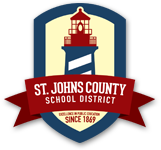Exceptional Student Education Eligibility for Students Who Are Visually Impaired
Florida State Board Rule 6A-6.03014
SJCSD Program for Visually Impaired students provides specialized instruction in all areas of the Expanded Core Curriculum to eligible students, age birth through their twenty-second birthday. Special education services are provided by fully certified itinerant Teachers of the Visually Impaired (TVIs) in a variety of educational settings including consultative support or direct services in both self-contained and general education classes in accordance with individual education plans (IEPs). Orientation and mobility instruction is provided by a certified Orientation and Mobility Specialist both on campus and in the community, as determined by the IEP.
The definition of students who are visually impaired includes the following:
- A student who is blind, has no vision, or has little potential for using vision
- A student who has low vision
- A student who has a visual impairment after best correction that adversely affects the student’s educational performance
- A student who has been diagnosed with a progressive condition that will most likely result in a visual impairment or no vision after best correction
Student Evaluation
- A completed SJCSD Eye Medical describing: etiology, diagnosis, treatment regimen, prognosis, near/distance, corrected/uncorrected acuity measures for left eye, right eye and both eyes, measure of field of vision, and recommendations for lighting levels, physical activity, aids, prescribed low-vision aids, or use of glasses or contact lenses, as appropriate
- For students who are otherwise unable to be assessed, a medical assessment describing visual functioning shall be documented when standard visual acuities and measure of field of vision are unattainable
- A comprehensive assessment of skills known to be impacted by visual impairment, which shall include, but is not limited to:
- A functional vision evaluation that includes an assessment of skills known to be impacted by vision impairment that are aligned with the special skills referenced in Rule 6A-1.09401, F.A.C., and include assistive technology, compensatory skills, career education, recreation and leisure, sensory efficiency, self-determination, social skills, and independent-living skills
- A learning media assessment
- An orientation and mobility screening
- A reevaluation shall occur at least every three (3) years and shall include:
- A minimum of a medical eye examination within the last calendar year
- A comprehensive assessment of skills known to be impacted by visual impairment as required for determining initial eligibility
- If appropriate, any other formal evaluations addressed in the initial evaluation in accordance with Rule 6A-6.0331, F.A.C. *The medical aspect of a reevaluation for students with bilateral anopthalmia may be waived by a written recommendation of a physician.
Eligibility Criteria
- A student is eligible for special education and related services if the following medical and educational criteria are met:
- A licensed ophthalmologist or optometrist has documented an eye condition that causes an impairment as manifested by at least one of the following:
- A visual acuity of 20/70 or less in the better eye after best possible correction
- A peripheral field so constricted that it affects the student’s ability to function in an educational setting
- A diagnosis of visual impairment after best correction, or
- A progressive loss of vision that may affect the student’s ability to function in an educational setting
- The student needs special education as defined in Rules 6A-6.0331 and 6A-6.03411, F.A.C.
- A licensed ophthalmologist or optometrist has documented an eye condition that causes an impairment as manifested by at least one of the following:
Expanded Core Curriculum
The Expanded Core Curriculum (ECC) includes nine major areas as identified by the National Agenda for the Education of Children and Youths with Visual Impairments, including those with multiple disabilities. The ECC is the body of knowledge and skills that are needed by students with visual impairments due to their unique disability-specific needs. Students with visual impairments need the expanded core curriculum in addition to the core academic curriculum of general education. The ECC should be used as a framework for assessing students, planning individual goals and providing instruction.
- Compensatory Skills
These critical skills include concept development and organizational skills, as well as communication skills, such as speaking and listening, sign language, tactile symbols, braille or print, reading and writing, and accessing recorded materials. - Orientation and Mobility
Skills to help a child to know where he/she is in space and to move safely, independently, and efficiently in the environment - Social Interaction
Skills needed to participate actively and appropriately in social situation - Independent Living
Skills of daily living needed to care for oneself independently, including personal hygiene, food preparation, cleaning, clothing care, and money management - Recreation and Leisure
Skills to promote the enjoyment of leisure activities, including learning new leisure activities and making choices about how to spend leisure time - Sensory Efficiency
Skills that help students to use all their senses, including functional vision, hearing, touch, taste, smell, proprioceptive and kinesthetic - Assistive Technology
Skills to use computers and other electronic and non-electronic equipment to function independently and effectively at school, home or work - Career Education
Skills that encourage students to explore career options, learn about the world of work and seek and maintain gainful employment - Self-Determination
Skills that enable students to become effective advocates for themselves based on their own needs and goals
Resources
20 Home Modifications for People with Vision Loss
Accessible Entertaining: Making Sure Your Disabled Guests Feel Safe and Welcome in Your Home
American Foundation for the Blind (AFB)
Founded in 1921, the American Foundation for Blind has spent nearly a century ensuring that individuals who are blind or visually impaired have access to the information, technology, education, and legal resources they need to live independent and productive lives.
American Printing House for the Blind (APH)
The American Printing House for the Blind (APH) is the world’s largest nonprofit organization creating educational, workplace, and independent living products and services for people who are visually impaired.
Association for the Education and Rehabilitation of the Blind and Visually Impaired (AERBVI)
AER supports professionals who provide education and rehabilitation services to people with visual impairments, offering professional development opportunities, publications, and public advocacy
Braille Authority of North America (BANA)
BANA promotes and facilitates the uses, teaching, and production of braille.
Bureau of Braille and Talking Books Library
The Bureau of Braille and Talking Books Library is a free service for individuals who cannot use standard print reading materials as the result of a visual, physical, or reading disability.
Florida Department of Education
Florida Department of Education – Florida’s Educational Opportunities for Students with Sensory Impairments
This pamphlet describes eligibility requirements for students with sensory impairments, services, and resources available to parents.
Florida Division of Blind Services (DBS)
DBS provides services to individuals of all ages whose primary disability is visual impairment to help them maximize their physical, vocational, social, and economic well-being. Services include vocational rehabilitation, counseling, guidance, parent training, and assistance in locating school and other community-based programs.
Florida Instructional Materials Center (FIMC)
FIMC is a statewide resource center designed to assist public and private schools in obtaining specialized materials for students with visual impairments.
Florida School for the Deaf and the Blind (FSDB)
The Florida School for the Deaf and the Blind in St. Augustine is the state’s public school for eligible deaf/hard-of-hearing, blind/low vision, and deaf-blind preschool through 12th grade students.
How to Design a Sensory Garden for the Blind or Visually Impaired
Legal Requirements of Hiring a Person with a Visual Impairment
Maxi Aids
An online catalog of products for independent living. The catalog includes products for needs such as vision, hearing, mobility, medical, household, and computers.
National Eye Institute
Provides eye health information, research, and resources for individuals and families wanting to learn more about today’s research for tomorrow’s vision.
Prepare a Visually Impaired Child for Daycare
Rehabilitation Center for the Blind and Visually Impaired
The Rehabilitation Center for the Blind and Visually Impaired is a place where people who are blind can reside temporarily while they learn to lead productive, self-sufficient lives.
Setting Up the Home Office After Vision Loss
UEB online
This website offers free, online training programs in braille literacy and mathematics using the Unified English Braille (UEB) code.
Visual Aid Volunteers of Florida (VAVF)
VAVF members include volunteer consultants with expertise in specialized areas of braille and tape production.


